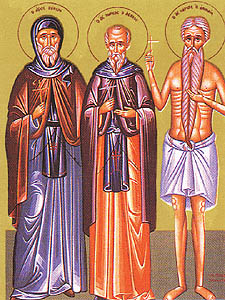|
|||
|---|---|---|---|
| This weekly bulletin insert complements the curriculum published by the Department of Christian Education of the Orthodox Church in America. This and many other Christian Education resources are available at http://dce.oca.org. | |||

Saint Mark the Ascetic was revered for his gentleness and for his ability to write with clarity about the "facts" of the Christian faith. There is not much information about Saint Mark's life, but he lived in the fifth century and knew many of the great Church leaders of that time, including Saint John Chrysostom, who was probably his teacher and mentor. At the age of forty he was tonsured a monk, and spent the next several decades as a hermit in the desert of the northwestern Nile Delta in Egypt. He prayed with the Scriptures so closely that he learned them by heart. But, studious as he was, he did not ignore the living creatures around him. He paid attention to what was happening to them. That is why he once noticed that the offspring of a hyena was blind, and wept for it. Because of his compassion the young animal's sight was restored. The mother hyena, in gratitude, brought him a sheepskin. While appreciating the mother's gift, he made it clear to her that she was never to kill the sheep of the poor people who lived in the neighboring villages. Saint Mark produced many writings, and in these we see his concern that people should have true knowledge, real facts, about the Christian life. So among his words are these: "Even though knowledge is true, it is still not firmly established if unaccompanied by works. For when we have totally neglected to practice something, our knowledge of it will gradually disappear." He is stating a basic fact: Just as God acted for us by becoming man and overcoming death, He wants us to have an active faith, not just an intellectual one. In our own time, many people claim to state the facts about Christianity with certainty, but they are completely wrong. In an issue of the New Yorker Magazine, Adam Gopnik, who is not a Christian, repeats a fairly common misrepresentation of Christianity. He writes that the Church's teaching is that "the omnipotent ruler of the universe could satisfy his sense of justice only by sending his son here to be tortured to death..." This is the example of someone who only writes about but does not act or live the Christian life, and therefore doesn't get his facts straight. Gopnik's description of the reason why Jesus Christ became Man completely ignores the true, factual reason why He did so: to save us, His creatures. As Christians, we have a duty to insist that people who write about our faith get their facts straight. This is why saints like Mark the Ascetic are so valuable. He not only wrote about the Christian faith but lived it. His words are true because they were "accompanied by works." I John 3: 18 tells us to do the same: "Little children, let us not love in word or speech, but in deed and in truth." |
|||
